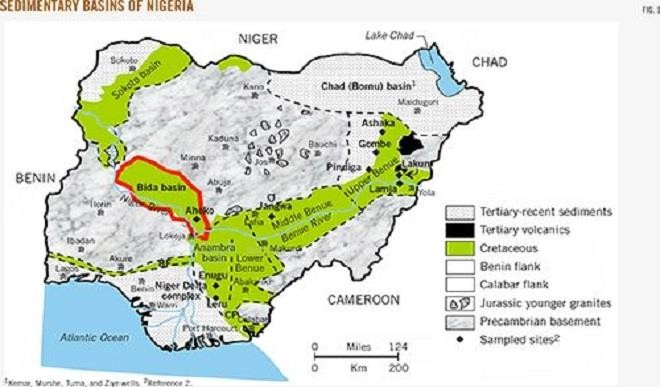Bida basin: A new resort for Nigeria’s oil dilemma
The report on the Bida basin hydrocarbon exploration research project carried out by the Ibrahim Badamasi Babangida University, Lapai with the support of the Niger state government was submitted on February 12, 2014 to the Department of Petroleum Resources (DPR) for technical audit and peer review queries. Since then there has been blind and deaf […]


The report on the Bida basin hydrocarbon exploration research project carried out by the Ibrahim Badamasi Babangida University, Lapai with the support of the Niger state government was submitted on February 12, 2014 to the Department of Petroleum Resources (DPR) for technical audit and peer review queries. Since then there has been blind and deaf ears as regards to the project.
Nigeria as a country is blessed with fully endowed crude oil which can take almost 40 years before it dries up, if there is no additional petroleum reserve.
Aside the dominant Niger Delta basin from which the country relies on for its economic survival, Nigeria is blessed with numerous other sedimentary basin comprising of Anambara, Bida, Sokoto, Borno (Chad), Dahomey basin, Lagos basin and the Benue troughs. These basins, according to the institutional research teams, have structural and stratigraphic similarities with the basins of Niger republic, Chad republic and Sudan where commercial oil accumulations have been discovered.
Narrowing it down, the Bida basin as identified by a collaboration of the research team of IBB University and the support of the Niger state government can serve as another reservoir and source for crude oil in the country. The Bida basin has been noted by the research as a source for a reasonable amount of crude reservoir for the country.
Considering the chaotic environment of the Niger delta where the people continuously agitate and boast about owning the richly oil endowed region. The formation and evolution of regional groups like the Movement for the Emancipation of Niger Delta (MEND) and the Niger Delta Avengers coupled with their nefarious activities easily comes to mind. In recent times, the Niger Delta Avengers have claimed a number of deadly attacks on pipelines in the country.
However, with regards to all the aforementioned pugnacious behaviors of Niger Delta militants other prospects need to be looked into. The Bida Basin is a NW-SE trending structure extending from slightly south of Kontagora in Niger state to the area slightly beyond Lokoja (Kogi state) in the south. According to the preliminary report, the preliminary geographical map on the Bida basin shows that mainly gas and some oil would have been generated within the prospective and more prospective sections in the basin.
Furthermore, the Shekang Group of China visited Niger state in June 2014 and was taken round the prospective areas in the Bida basin. Significantly, the group who expressed general satisfaction with the preliminary basinal assessment collected samples for further analysis in China.
In light of all these, to curtail the monopolization of oil in only one dominant region, more reservoirs like the Bida basin should be given much more attention so as to bring it into reality. According to the research report, in order to meet the MOU agreement with Energy Commission of Nigeria, the technical committee/IBBU will need to drill more wells for data collection at Makera (near Kontagora) and at Mokwa. The energy commission will drill at Gaba and Duba. Availability of more data will attract investors to acquire exploration blocks in the Basin.
In this regard, I am calling on all stakeholders, government both state and federal, Nigerian National Petroleum Corporation (NNPC), its subsidiary the DPR and other related agencies to partner extensively to bring to limelight the Bida basin that is still a paper work. The necessary data needs to be generated, the appropriate drilling locations needs to be modeled and selected so as to ensure full exploration, exploitation and exportation of the basin.
Abdullahi Yusuf Tela, Abuja
